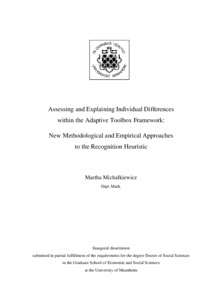|
Assessing and explaining individual differences within the adaptive toolbox framework : new methodological and empirical approaches to the recognition heuristic
Michalkiewicz, Martha
![[img]](https://madoc.bib.uni-mannheim.de/41322/1.hassmallThumbnailVersion/Dissertation_Michalkiewicz.pdf)  Vorschau |
|
PDF
Dissertation_Michalkiewicz.pdf
- Veröffentlichte Version
Download (2MB)
|
|
URL:
|
https://madoc.bib.uni-mannheim.de/41322
|
|
URN:
|
urn:nbn:de:bsz:180-madoc-413227
|
|
Dokumenttyp:
|
Dissertation
|
|
Erscheinungsjahr:
|
2016
|
|
Ort der Veröffentlichung:
|
Mannheim
|
|
Hochschule:
|
Universität Mannheim
|
|
Gutachter:
|
Pohl, Rüdiger F.
|
|
Datum der mündl. Prüfung:
|
9 August 2016
|
|
Sprache der Veröffentlichung:
|
Englisch
|
|
Einrichtung:
|
Fakultät für Sozialwissenschaften > Kognitive Psychologie u. Differentielle Psychologie (Erdfelder 2002-2019)
Außerfakultäre Einrichtungen > GESS - CDSS (SOWI)
|
|
Fachgebiet:
|
150 Psychologie
|
|
Normierte Schlagwörter (SWD):
|
Entscheidungsverhalten , Wiedererkennen , Heuristik
|
|
Freie Schlagwörter (Englisch):
|
Decision making , fast and frugal heuristics , recognition heuristic , individual differences , personality , intelligence , multinomial processing tree models , hierarchical Bayesian modelling
|
|
Abstract:
|
Individuals do not only show large differences with regard to the judgments and
decisions they make, but also with regard to the strategies they use to arrive at their
decisions. However, individual differences in decision strategy selection have gained
insufficient attention so far. For this reason, I investigate individual differences with
respect to the application of the fast-and-frugal heuristics of the adaptive toolbox – a
framework that has become increasingly important within the field of decision making.
In particular, I address one of the most prominent examples of the adaptive toolbox: the
recognition heuristic (RH), that is, a decision strategy for paired comparisons which
bases choice solely on recognition while ignoring any additional information.
The overarching aim of my thesis is to enhance the understanding of the
cognitive and personality traits underlying individual differences in use of the RH.
However, so far, there has been a deficiency in the methods relating individual traits to
RH-use. For this purpose, I extend a measurement model of the RH to a hierarchical
version incorporating individual traits directly into the estimation of RH-use. This
methodological advance allows detection of the dispositional determinants of variation
in strategy selection regarding the RH in a straightforward and unbiased way.
Equipped with the required methods, the first project reported in this thesis
investigates temporal and cross-situational stability in use of the RH. By demonstrating
these important preconditions, I ensure that it is principally possible to find reliable
relations between individual traits and RH-use. Building upon these results, the second
project addresses the effect of (fluid and crystallized) intelligence on individual
differences in adaptive RH-use. In sum, there is supportive evidence that adaptive
application of the RH to the decision context is moderated by fluid but not crystallized
intelligence. Extending this line of research, the third project aims at explaining
individual differences in RH-use free of any interaction with the situation. In brief, RHuse is found to decrease with need for cognition (i.e., inclination towards cognitively
demanding activities) but not to increase with faith in intuition (i.e., trust in feelings).
To conclude, by means of the three projects reported herein and with the aid of
the newly developed hierarchical measurement model of RH-use, I demonstrate that
RH-use represents a person-specific decision making style that is temporally and crosssituationally stable, and that is affected by fluid intelligence and need for cognition.
|
 | Dieser Eintrag ist Teil der Universitätsbibliographie. |
 | Das Dokument wird vom Publikationsserver der Universitätsbibliothek Mannheim bereitgestellt. |
 Suche Autoren in Suche Autoren in
Sie haben einen Fehler gefunden? Teilen Sie uns Ihren Korrekturwunsch bitte hier mit: E-Mail
Actions (login required)
 |
Eintrag anzeigen |
|
|
